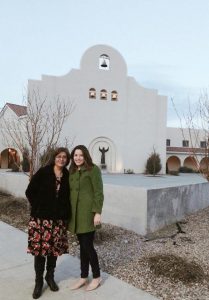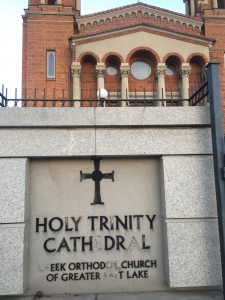About 15 million members of the Church of Jesus Christ of Latter-day Saints will gather for General Conference in April.
Aurelia Berryhill, LDS member and BYU media arts major, said she looks forward to General Conference.
“I’m excited because it’s the semi-annual spiritual recharge I need,” Berryhill said. “We can read or watch conference talks any time, but it’s a cool thing to me that we can gather as saints, even if we’re in our own home, to listen to the words of the prophets and apostles.”
But Latter-day Saints are not the only ones who gather to receive religious instruction. Several other religious groups throughout Utah also gather to receive religious instruction from spiritual leaders.
Catholic
Catholics gather to receive instruction from the pope for several different occasions, according to BYU religion professor Mauro Properzi.
“Some Catholics from different parts of the world follow specific Vatican Masses at St. Peter’s, usually for Christmas or Holy Week, through the internet,” Properzi said.

Catholic UVU student Norma Salas said Pope Francis leads the Mass every Sunday. Salas hopes to one day go to the Vatican and hear the pope’s homily, a commentary about a verse of scripture, in person. Salas worships regularly with her family.
“Every Saturday or Sunday — it is the same Mass those days — my family and I go to St. Francis (of Assisi) Catholic Church where we hear from the priest, the New and Old Testament, as well as our priest’s homily too,” Salas said.
Every priest prepares his own message to share, but it is based on what the pope said, especially on the the Holy Thursday and Christmas Eve Masses, Salas said.
Salas said the most important reason for attending Mass is to take the eucharist, the bread and wine.
“I choose to participate, such as by attending Mass, because going to church and taking notes (of what) is said helps me grow in my faith and allows me to reflect on the blessing Christ has given me through the week,” Salas said.
Vanessa Maffatt, a Catholic student and BYU psychology major, said some of the pope’s speeches are televised or aired on the radio. When a new pope is chosen, it’s a major event.
“That’s a pretty big thing,” Maffatt said. “In high school — I went to a private Catholic school — we stopped what we were doing and watched it.”
Hindu
Hinduism is a ancient polytheistic religion, and there are hundreds of denominations within it, according to Indra Neelameggham, a senior member of the Hindu community and a member of the Salt Lake Interfaith Roundtable board.
Hindu worship is individual, meaning people can choose which god to worship and whether they worship with a guru or teacher.
“There are hundreds of religious gurus who have disciples coming to attend their interpretation of Vedic knowledge,” Neelameggham said. “Such events are local and spread out through out India and the world.”
While there is not a single spiritual leader for all Hindus, there are some regional leaders Hindus can learn from if they choose.
“We have chosen ‘revered’ persons that may vary by geographical region, family tradition, language or cultural groups, or convenience to suit urban, rural or local needs,” Neelameggham said.
Hindus periodically gather in famous historic places such as Maha Magam in South India or Kumbha Melas of northern areas in India, according to Neelameggham. Several religious leaders meet there to discuss social policies. Thousands of Hindus attend these meetings.
Greek Orthodox

Reverend Father Elias Koucos of the Greek Orthodox faith said they have gatherings similar to LDS General Conference.
Greek Orthodox bishops and archbishops speak to members and clergy in regional and national gatherings, Koucos said. Bishops, invited clergy, and theologians speak at each of the gatherings.
In the United States, the national Greek Orthodox gathering is held every other year on even-numbered years. Regional conferences take place twice a year on odd-numbered years.




